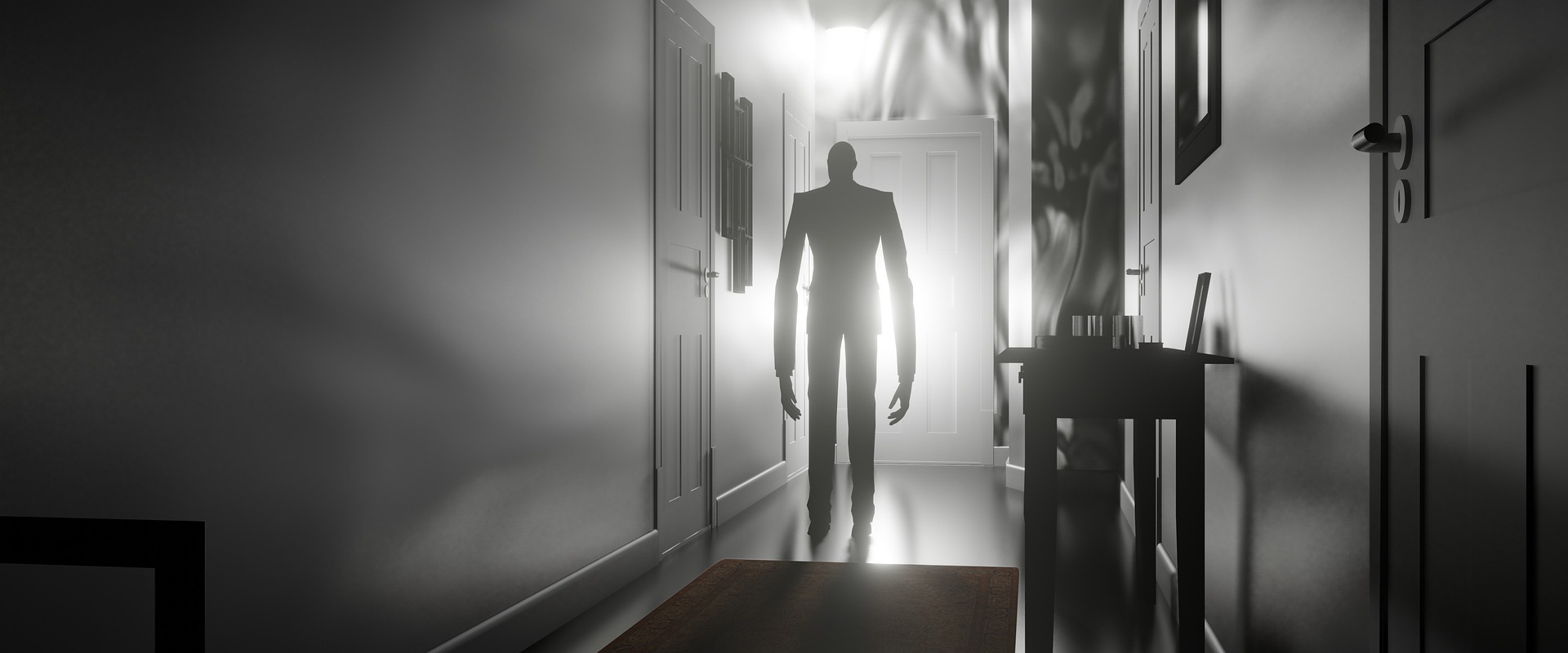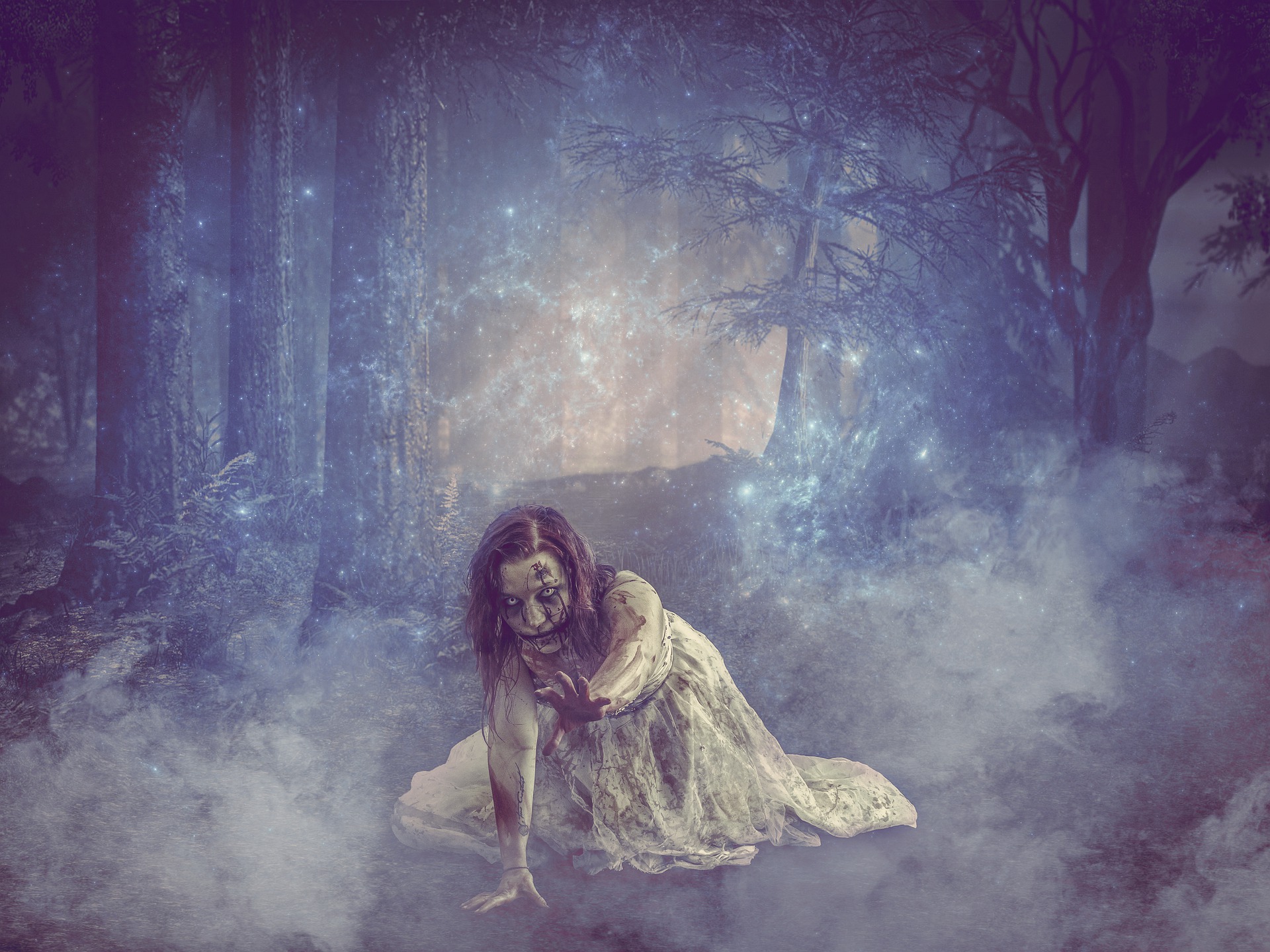 Submitted by Paranorman on
Submitted by Paranorman on

Derivative Images
Exploring the Darkside ...
Whatever your background is, it's bound to happen to you: the scary paranormal case. We're not talking about your run-of-the-mill haunting here. We're talking portal hauntings, negative entities, and bad earthbound spirits—in a nutshell, things that scare us!
These cases usually start out as a seemingly routine investigation; then, somewhere along the line, it becomes clear that something much more sinister is happening. But how do we know when the line to the dark side has been crossed? And what do we do about such cases? The first step in such situations to is identify what, exactly, is happening at the location. Let's take a look at each of these phenomena in more detail.

Derivative Images
- Portal Hauntings
Unlike the typical haunted location (be it a home, restaurant, museum, etc.), a portal haunting usually involves an actual "tear," or gateway, in the environment that allows spirits and negative entities to enter our world. Because of this, inhabitants of these locations typically do not experience the same spirit or activity on a regular basis. In other words, instead of residents seeing the ghost of "Aunt Martha" in the upstairs bedroom each night, they are experiencing a wide range of often mind-boggling activity.
It's not uncommon at these haunted places to see such odd things as bizarre creatures or the spirits of people who aren't associated with the location, and hearing things that most people would associate with a horror movie rather than an actual haunted home. It is this grab bag of strange phenomena that usually helps investigators identify portal hauntings.
Modern examples of portal hauntings include cities like Eureka Springs, Arkansas, where people claim that the entire city is haunted; cemeteries that have actual paranormal activity occurring (unlike the 99% of all cemeteries, which often staked out by thrill seekers); and places that seem to fall along the intersection of ley lines (like the famously haunted Manresa Castle in Port Townsend, Washington).
And while nailing down the exact nature of a portal itself may seem a daunting task, it does seem clear that a LOT of strange things seem to happen at these locations.
During one of my personal investigations of just such a place in Tennessee, my Paranormal Inc. co-investigators and I heard a sound that I have never heard at any other haunted location. It was a long, guttural growl that started low in volume, that then slowly ramped up to incredibly loud. This was particularly alarming at the time, since WREG-TV in Memphis had listed this place as one of the ten most haunted locations in the area (one that featured "ferocious beasts").
Luckily, we were not confronted by any strange creatures that night—but, such can be the case for those who live in and around portal hauntings. Of course, one of the things that make portal hauntings so frightening is the common appearance of negative entities.

- Negative Entities
While there seems to be a tendency for most people in Western society to label negative entities as "demons," the truth is that there are several types of these spirits—and none of them are necessarily dependent on any one religion (or any religion at all, for that matter). Generally speaking, these entities are classified as either non-human spirits, elementals, or thought forms.
Non-human spirits are unlike typical ghosts in that they never actually lived as a person. For those that are religious, these spirits are often called djinn (such as the shayatin in the Islam religion), shedu (an evil spirit in Chaldean mythology), or the yaoguai (a Chinese demon). And, yes, there are commonly-known Christian demons, as well. For those who are not religious, these entities are simply evil spirits that invade an area with the intent to spread fear, chaos, and generally harass the living.
Many turn to their own religious faith or clergy to be purged of such spirits, but paranormal investigators who rely on common ghost hunting methods have also had success with assisting clients with such cases—though they can often be very touch-and-go. But neither of these approaches will be effective, however, if the spirit is yet another type of non-human spirit—an entity that's often termed an elemental.
Elementals originate in mythology and actually have their beginnings in supposed living creatures, such as gnomes, elves, nymphs, etc. But according to many mythological systems, these creatures would often have the ability to shape shift and appear as anything they desire. It's because of this ability that many modern paranormal researchers have concluded that these entities are actually more spirit-like in nature. In addition to this, elementals also have another defining characteristic: a link to nature.
Because elementals are attributed to the basic elements of the planet (air, water, earth, and fire)—hence the name "elemental"—many believe these spirits to be as old as the planet itself. Manipulating these primitive entities was often the goal of many ancient magic systems.
Ancient religions such as the Norse, the Germanic tribes (Saxons, etc.), and the Celts believed whole-heartedly in such beings—and, believe it or not, sightings of such creatures (particularly the fairies of Irish/English myth) still occur on a regular basis. Now, while the idea of being "haunted" by a fairy may seem ridiculous, there have been cases in the past where seasoned investigators have attributed paranormal activity to these nature-based spirits. One such case/location is the infamous Leap Castle in Ireland, where an elemental is said to reside.
A former resident of this castle, Mildred Darby, told the Occult Review journal in 1909 about an encounter with this elemental spirit. She said, "I was standing in the gallery looking down at the main floor when I felt somebody put a hand on my shoulder. The thing was about the size of a sheep." She described the figure as being "thin, gaunt, shadowy." She goes on, though, saying, "Its face was human, to be more accurate, inhuman. Its lust in its eyes, which seemed half decomposed in black cavities, stared into mine. The horrible smell one hundred times intensified came up into my face, giving me a deadly nausea. It was the smell of a decomposing corpse."
It's because of encounters like this that elementals are most often thought of as negative entities—and most hauntings that contain an elemental presence usually turn out to be frightening in the extreme to residents of the location.
The last type of negative spirit worth mentioning is actually not a spirit at all; it's known to researchers as a "thought form." Much like a residual haunting, this type of activity is usually something that has been "recorded" into the environment and is now being experienced by the living.
Whereas residual hauntings involve a physical type of activity (such as hearing odd voices/noises or smelling the scent of a long-gone perfume), a thought form is often the negative energy left behind by a bad person (living or dead) or a particularly evil deed. This energy can often cause the residents of a place to suddenly shift personality, do horrible things they normally wouldn't, and think terribly dark thoughts.
An example of a possible thought form involves the all-too-well-known "Amityville Horror" case. The Lutz family reported that soon after moving into the house on Ocean Avenue, that family members all exhibited sudden changes in their personalities—changes that were all for the worse. One such incident is recorded in the famous book about the house when George and Kathy Lutz snap and beat their children with wooden spoons. Because of the book and the infamy surrounding the house, it's pretty much public record what horribly evil events occurred in that house.
Many also believe that persistent nightmares (or night terrors as they are sometimes called) and even hallucinations of "something" being in someone's home are simply the byproducts of a particularly nasty thought form. The usual cure for such things is to "clear" or "cleanse" the environment; one such method is the projection of negative ions into the air. Negative ions are known for helping people feel happy and to help those suffering from depression. - Bad Earthbound Spirits
If a person was bad when he/she was alive, doesn't it seem to reason that their spirit would be bad, too? And if just such a spirit haunts a particular site...well, it can be disturbing at best, and downright horrible in the worst cases.
Unlike negative entities, bad earthbound spirits are the ghosts of once living people who were simply bad people. It's because of the evil intent of these spirits to harass and scare the living that these entities are often thought of as being "demons" or other negative entities. Paranormal groups that focus on religious matters often mistakenly label these ghosts as such—and are most often unsuccessful at removing these spirits from a location because they are using religious rituals geared towards driving away negative entities (such as "clearings" or "exorcisms").
While enduring the often frightening activity of these malicious spirits can seem a challenge, it's always helpful to inform those afflicted with this type of haunting that, in the end, the spirit is simply that of an angry person. And ridding yourself of just such a spirit is often the same as ridding yourself of just such a person. Why is he or she angry? Can this be remedied in some way to encourage the spirit to move on?
Encounters with this type of spirit is quite common—you can read about just such an case in my book Devil in the Delta. Vengeful spirits with unfinished business can create a lot of chaos in a home—and when the home owner believes that something even worse (yes, a demon) is in their residence...well, you get the point.

So, whenever any of us encounter something from the dark side—whether it's a portal haunting, a negative entity, or an angry earthbound spiri—it's important to concentrate on the basics of paranormal investigation, stick to the scientific method, and at all costs do whatever is required to help those living in the residence.
Because, in the end, it is them that must be led to the light.
Rich Newman
https://www.llewellyn.com/journal/article/2368
Copyright © 05-20-2013-2021 - Llewellyn Worldwide, Ltd.
- 867 reads